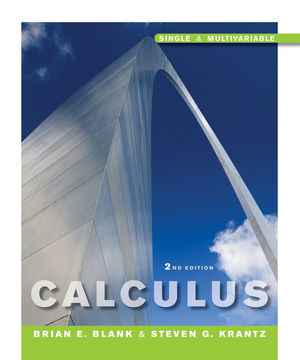
Calculus: Single and Multivariable, 2nd Edition
By By Brian E. Blank, Steven G. Krantz
Calculus: Single and Multivariable brings together time-tested methods and innovative thinking to address the needs of today’s students. Using meaningful examples, credible applications, and incisive technology, Calculus strives to empower students, enhance their critical thinking skills, and equip them with the knowledge and skills to succeed in the major or discipline they ultimately choose to study. This course makes the language of mathematics accessible, understandable and enjoyable, while maintaining high standards for mathematical rigor.
Schedule a Demo Sign Up for a Test Drive Adopt WileyPLUSWant to learn more about WileyPLUS? Click Here
Read, Study, and Practice
Students learn course concepts using the complete online eTextbook, flashcards, crossword puzzles, practice questions, videos, and animations. Organized by learning objective, students can filter for relevant learning resources based on what they need to study most and print any section of the eTextbook.
ORION Adaptive Practice (when available)
Every student has a different starting point, and adaptive practice provides endless opportunities for practice to effectively prepare for class or quizzes and exams. Active retrieval of information with practice questions is proven to improve retention of information better than re-reading or reviewing the material, and students who use adaptive practice to prepare for exams do significantly better than those who do not. Students begin with a quick, chapter-level diagnostic to determine their initial level of understanding, and they can use the dashboard and quick reports to see what topics they know and don’t know.
Assignments
Students who fully engage in WileyPLUS assignments do better in the course by more than a letter grade. Auto-graded assignments give students immediate feedback based on flexible assignment settings determined by the instructor, while the notification center allows students to set their own email notification policies to stay on track.
Instructors can select from extensive and reliable question banks to create and deploy reading, practice, homework, pre-post lectures, and assessment assignments. This course includes essay, label drag-and-drop, multiple choice, text entry, and true-/false question types.
Gradebook
Students know where they stand on WileyPLUS assignments, and they can track progress by learning objective.
Instructors have insights into student performance at the granular question attempt and can track trends by individual student, assignment, or learning objective. Flexible policies allow instructors to change points, set assignment weighing policies, extend individual due dates, or drop the lowest grade.
Brian Erf Blank is an associate professor of mathematics at Washington University in St. Louis. He received his Ph.D. in 1980 at Cornell University, with Anthony Knapp as advisor. His 20th century work involved harmonic analysis.
Steven George Krantz is an American scholar, mathematician, and writer. He has authored more than 235 research papers and more than 125 books. Additionally, Krantz has edited journals such as the Notices of the American Mathematical Society and The Journal of Geometric Analysis.
Chapter 1. Basics
Chapter 2. Limits
Chapter 3. The Derivative
Chapter 4. Applications of the Derivative
Chapter 5. The Integral
Chapter 6. Techniques of Integration
Chapter 7. Applications of the Integral
Chapter 8. Infinite Series
Chapter 9. Vectors
Chapter 10. Vector-Valued Functions
Chapter 11. Functions of Several Variables
Chapter 12. Multiple Integrals
Chapter 13. Vector Calculus

